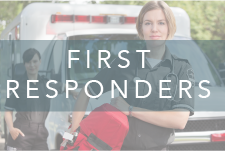First Responders: Reaching Out and Accepting Help
- Sep 2, 2021
- 6 min read
Updated: Oct 16, 2025

First responders are constantly putting the safety of others before their own. However, taking the time to care for their own mental and physical well-being is paramount. Knowing how to reach out for help is an essential skill, but it can be a hurdle for many first responders.
Why is it so hard for first responders to ask for help?
It can be difficult for first responders to ask for help because of a deeply ingrained culture of stoic heroism. They may feel that asking for assistance is a sign of weakness or failure, which could compromise their ability to do their job or affect their image.
The mentality around asking for help is a major block for first responders. We'll explore how they can change this mindset by starting small and setting clear expectations for their needs.
What makes it difficult for first responders to ask for help?
First responders occupy a unique space as they are tasked with constantly putting others’ wellbeing and safety before their own as they serve the people in their communities each and every day.
The ability to reach out for help in one’s personal or professional life is an essential skill. However, it needs to be actively practiced in order to produce benefits.
While this role of a guardian or protector may feel at odds with asking for help, the ability to reach out during times of difficulty is an important skill to ensure that each first responder is keeping themselves mentally and physically healthy.
Taking steps to normalize asking for assistance can initially feel like a counterintuitive practice for first responders. However, it is paramount in caring for oneself and, by extension, properly serving one’s family and community.
First Responders Reaching And Accepting Help: Why Asking Is Such a Hurdle
Asking for help can be a complicated hurdle on its own. While the act of asking another for help may seem simple on the surface, it can be incredibly difficult in practice. As a result, asking for help demands that an individual understands why it seems difficult in the first place.
Receiving assistance can inherently cause an individual to feel like they are in a vulnerable position. One may feel as if requiring assistance indicates that they have failed in some way or that they are now in debt to another.
Others may feel the inherent vulnerability is a negative thing in their lives. It is also possible that asking for help can be a hurdle due to trust. An individual may believe they are the only one who can tackle the issues in front of them.
For first responders, these can all be common feelings. First responders are typically asked to maintain an air of stoic heroism that shouldn’t need help. There can also be a fear that showing any kind of weakness might compromise one’s ability to do their job, handle high-stress situations, or affect their image.
However, this creates a cycle of isolation that needs to break. Encouraging First Responders Reaching And Accepting Help is an important step toward changing that culture and creating space for support, resilience, and mental well-being.
Changing the Mentality
While the actual act of asking for help is simple, the mentality surrounding it can be a major block. Learning to ask for help is not about engaging in exercises to raise one’s voice. In fact, first responders may already be able to speak clearly and effectively as a result of their work. Rather, learning to ask for help either at home or in the field instead means addressing the mentality surrounding the act.
Start Small
Breaking through the resistance surrounding asking for help and proving to oneself that it is okay to be on the receiving end is a major mental shift. Small instances allow an individual to see the potential benefits and change therein. Asking others to help cover shifts, borrow an item, or help carry something are all low-risk propositions to begin normalizing the idea that asking for help is okay.
These little things serve a great purpose. Not only can asking these questions begin to instill the idea that asking for assistance is not a big deal, but it can also help to establish trust between oneself and others. Asking for help does not have to be a universal practice, but rather the development of a relationship with a few trusted people. Embracing trust and normalizing these questions is the cornerstone to building these beneficial relationships.
Asking and Ordering
Asking for help is inherently different than ordering another to aid in something. While asking for help is an exercise in trust, vulnerability, and the development of camaraderie, commanding another to assist does not reflect these same goals. Learning the difference between asking and commanding is essential in developing the right mentality surrounding assistance, and creating a healthy atmosphere for a person and their family, friends, and coworkers.
Set Expectations
Knowing what one wants before reaching out for help can aid in gauging the effectiveness of asking for help. Setting these clear expectations can help an individual vocalize exactly what they may need help with. Doing so also helps to identify when others may go beyond what they are expected and make themselves into trusted, supportive people.
Provide Time and a Chance
Breaking through the stoic mentality of one’s preconceived notions surrounding asking for help takes time. While reaching out is a huge step even on a small scale, it is still important to provide others a chance to help. It can take time for an individual to complete a request, and sometimes those who prove to be invaluable in one’s goals are unexpected individuals.
Embracing this new mentality is not something that can be rushed. Taking time for oneself and only developing a deeper trust in those who are consistently by one’s side is a perfectly healthy approach to embracing this new and important norm.
Frequently Ask Questions:
• What are some of the common feelings that first responders experience when it comes to asking for help?
First responders may feel vulnerable and believe that asking for help indicates failure or that they are indebted to others. They may also feel that they are the only ones who can handle the issues they face.
• What is the difference between asking and ordering someone to help?
Asking for help is an exercise in trust and vulnerability that helps build camaraderie. Ordering someone to assist does not reflect these same goals and does not create a healthy atmosphere.
• How can first responders begin to normalize asking for help?
They can start small with low-risk situations, such as asking for help covering a shift, borrowing an item, or carrying something. This helps prove that it's okay to be on the receiving end of assistance.
• Why is it important for first responders to set expectations before reaching out for help?
Setting clear expectations helps first responders vocalize exactly what they need. It also helps them identify when others go beyond what's expected and become a trusted source of support.
• Does changing the mentality around asking for help happen quickly?
No, it's a process that takes time. It's perfectly healthy to take time for oneself and only develop a deeper trust with those who consistently show their support.
At Chateau Health and Wellness, we know that taking that first step to ask for help is a sign of immense strength, not weakness. Our compassionate and specialized team is here to support you and your fellow first responders as you navigate the unique challenges of your profession. We are committed to providing a safe and understanding space where you can focus on your well-being, so you can continue to serve your community with a full tank. We believe that caring for yourself is an act of service, and we are here to help you on that journey. Call us today at (435) 222-5225; we are ready to assist you.

About The Author
Ben Pearson, LCSW - Clinical Director
With 19 years of experience, Ben Pearson specializes in adolescent and family therapy, de-escalation, and high-risk interventions. As a former Clinical Director of an intensive outpatient program, he played a key role in clinical interventions and group therapy. With 15+ years in wilderness treatment and over a decade as a clinician, Ben has helped countless individuals and families navigate mental health and recovery challenges.
Danny Warner, CEO of Chateau Health and Wellness
Brings a wealth of experience in business operations, strategic alliances, and turnaround management, with prior leadership roles at Mediconnect Global, Klever Marketing, and WO Investing, Inc. A graduate of Brigham Young University in Economics and History, Danny has a proven track record of delivering results across diverse industries. His most transformative role, however, was as a trail walker and counselor for troubled teens at the Anasazi Foundation, where he directly impacted young lives, a personal commitment to transformation that now drives his leadership at Chateau.
Austin Pederson, Executive Director of Chateau Health and Wellness
Brings over eight years of experience revolutionizing mental health and substance abuse treatment through compassionate care and innovative business strategies. Inspired by his own recovery journey, Austin has developed impactful programs tailored to individuals facing trauma and stress while fostering comprehensive support systems that prioritize holistic wellness. His empathetic leadership extends to educating and assisting families, ensuring lasting recovery for clients and their loved ones.









